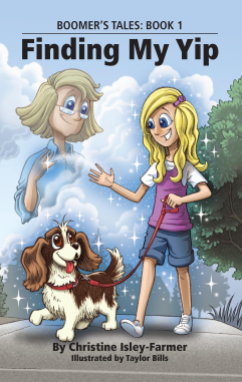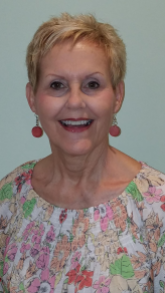FOR IMMEDIATE RELEASE:
 Murfreesboro, TN — Christine Isley-Farmer weaves together a charming tale featuring a Cavalier King Charles Spaniel as the story’s narrator. “Finding My Yip” (March 2, 2021, Wandering in the Words Press) is the first book in her “Boomer’s Tales” series.
Murfreesboro, TN — Christine Isley-Farmer weaves together a charming tale featuring a Cavalier King Charles Spaniel as the story’s narrator. “Finding My Yip” (March 2, 2021, Wandering in the Words Press) is the first book in her “Boomer’s Tales” series.
When Boomer is a puppy he is unable to yip like his mother and sisters. Boomer lives with Nana Weathers, a musician who possesses a magical ring that helps them communicate. Boomer quickly bonds with Nana’s nine-year-old granddaughter Chloe, who has a stutter. Chloe’s big wish is to sing beautifully like Nana. Chloe and Boomer make new friends at dog obedience school and grow their confidence together. By teaming up in the music room and gaining a little help from their friends, Chloe and Boomer try to find their voices.
The stories in opera and song have always fascinated and inspired Christine. The power of storytelling and music’s healing qualities have woven their way through her life and found a voice in this series. Chloe and Boomer seek to develop confidence, make friends, and strengthen their bond while challenging their greatest fears.
“Finding My Yip: Boomer’s Tales: Book 1”
Christine Isley-Farmer | March 2, 2021 | Wandering in the Words Press
Paperback | 978-1-7332126-6-3 | $8.95
EBook | 978-1-7332126-7-0 | $3.95
Children’s Chapter Book
About The Author
 Christine Isley-Farmer, Professor Emerita of Music at Middle Tennessee State University, has had extensive experience in both opera and concert. Her broad performance history includes opera, operetta, musical theatre, oratorio, and concerts in the United States and Europe. Dr. Isley-Farmer earned her bachelor’s and master’s degrees in voice performance from the University of North Carolina at Greensboro, where she taught for 2 years after her return from Europe, and the D.M.A. in voice performance and literature with a minor in German Literature from the University of Illinois at Urbana-Champaign.
Christine Isley-Farmer, Professor Emerita of Music at Middle Tennessee State University, has had extensive experience in both opera and concert. Her broad performance history includes opera, operetta, musical theatre, oratorio, and concerts in the United States and Europe. Dr. Isley-Farmer earned her bachelor’s and master’s degrees in voice performance from the University of North Carolina at Greensboro, where she taught for 2 years after her return from Europe, and the D.M.A. in voice performance and literature with a minor in German Literature from the University of Illinois at Urbana-Champaign.
Since 1997, Dr. Isley-Farmer has been a certified teacher of the Alexander Technique and is a teaching member of Alexander Technique International. Her articles on Alexander Technique and singing have been published in professional journals.
In an interview, Christine Isley-Farmer can discuss:
- Her education and career revolving around music both as a performer and educator
- The themes of friendship, trust, teamwork and determination in the book
- Why she wanted to include a child with a stutter in her book
- The second book in this series, which is a mystery
- Her love for the Cavalier King Charles Spaniel dog breed
- What it was like to have a career as a professional singer
An Interview with Christine Isley-Farmer
1. How does your choice of nine-year-old Chloe having a stutter and young puppy Boomer being unable to bark create a bond and empathetic relationship between the two?
Chloe and Boomer instinctively understand and connect with one another, because they are dealing with similar problems. Chloe immediately recognizes Boomer’s inability to yip, but she isn’t judgmental. She accepts Boomer as he is, because his problem mirrors the ones she has making friends, speaking, and singing. Instead, Chloe bonds with Boomer and is selfless in her pursuit to find out about his problem, spending extra time with him, reading to him from her poetry notebook, and sharing her true feelings with him. This interaction builds a bond of trust between the two – a model of true friendship.
2. What do you want the children who read this book to learn?
My book tells the story of a yipless dog and a child whose stutter challenges her to face her fears making friends, expressing herself in speech, and fulfilling her dream of being able to sing. In the process of growing, the dog and she have to contend with self-doubt at pivotal points and rise above them. Learning to trust one’s instincts and others, teamwork (seeing self through others) and growing self-confidence are lessons in my book.
3. How did you become interested in writing children’s stories, and why did you choose this topic?
I have a great-nephew and great-niece to whom “Finding My Yip” is dedicated. I wanted to write this book and series as a part of an artistic legacy. I had once read a man should plant a tree, have a son (child), and write a book. As a woman, I have accomplished two of these, so writing books for children substitutes for having a child in my case. Additionally, some of my strongest learning and definitive experiences were in my childhood. The freedom I experienced singing, dancing (being expressive), and reading took me out of the dysfunctional atmosphere in my home.
I chose the topic of stuttering because it inhibits full and free vocal expression. As a child, I found it difficult to express what I was feeling, although I didn’t have a stutter. However, inside of me, I felt that I couldn’t be me, because I knew I most certainly would be punished if I did.
4. When you were a child dreaming of becoming a singer, how did your father’s lack of support affect you?
My father, who had lived through the Depression when his family lost everything, was afraid I wouldn’t be able to earn a living as a singer. The more he tried to discourage me with the threat of not supporting me financially in college, the more I became determined to study what I loved. My mother stood by me in my decision to pursue music.
5. How did you first become interested in singing, and what are the important qualities for a professional singer to possess?
My first singing experiences as a child were in church, but I loved making up my own songs and dancing and singing by myself in my yard. I also studied piano and took tap and ballet classes. In high school, I sang in choir and became interested in opera after seeing a performance of The Barber of Seville. I borrowed some opera recordings from my cousin and fell deeply in love with the genre. I also began voice lessons the summer before my senior year. My high school had by then a dynamic choral director who took an interest in my voice and encouraged me to audition for music scholarships.
The great tenor Caruso once said that a singer has to have a big mouth, a good memory, and something in the heart. One of my former professors in graduate school who had had a professional singing career in Europe told me one has to have 10% talent and 90% perseverance. I would add work ethic, good musicianship, foreign languages (opera and art song), acting/dancing skills, and collegiality.

A former award-winning journalist with national exposure, Marissa now oversees the day-to-day operation of the Books Forward author branding and book marketing firm, along with our indie publishing support sister company Books Fluent.
Born and bred in Louisiana, currently living in New Orleans, she has lived and developed a strong base for our company and authors in Chicago and Nashville. Her journalism work has appeared in USA Today, National Geographic and other major publications. She is now interviewed by media on best practices for book marketing.
